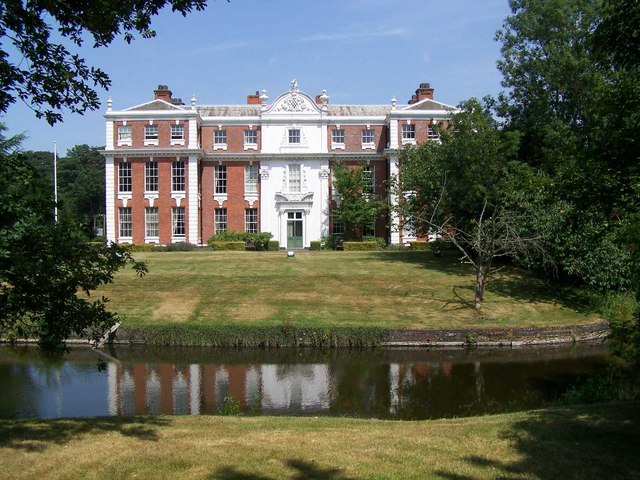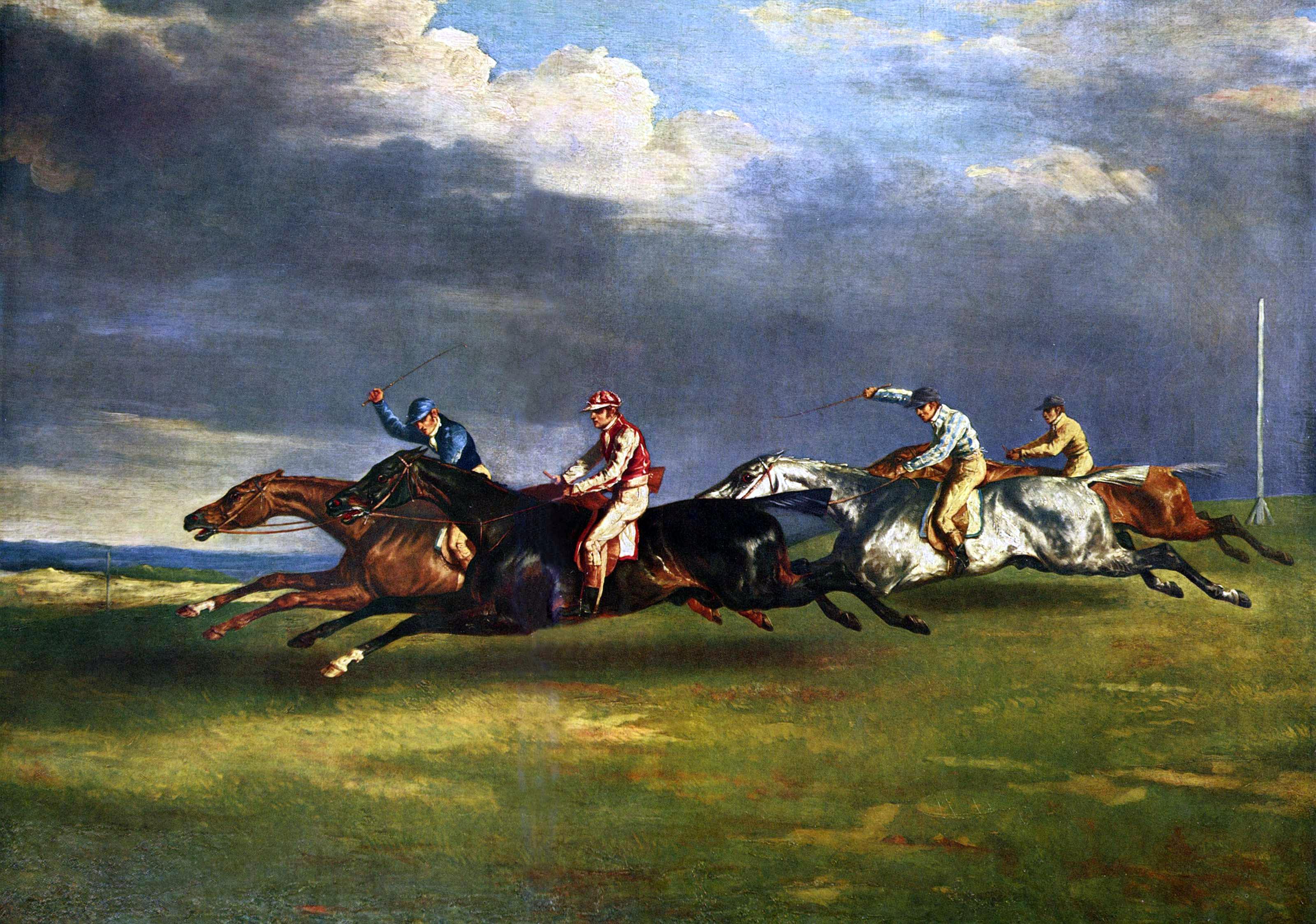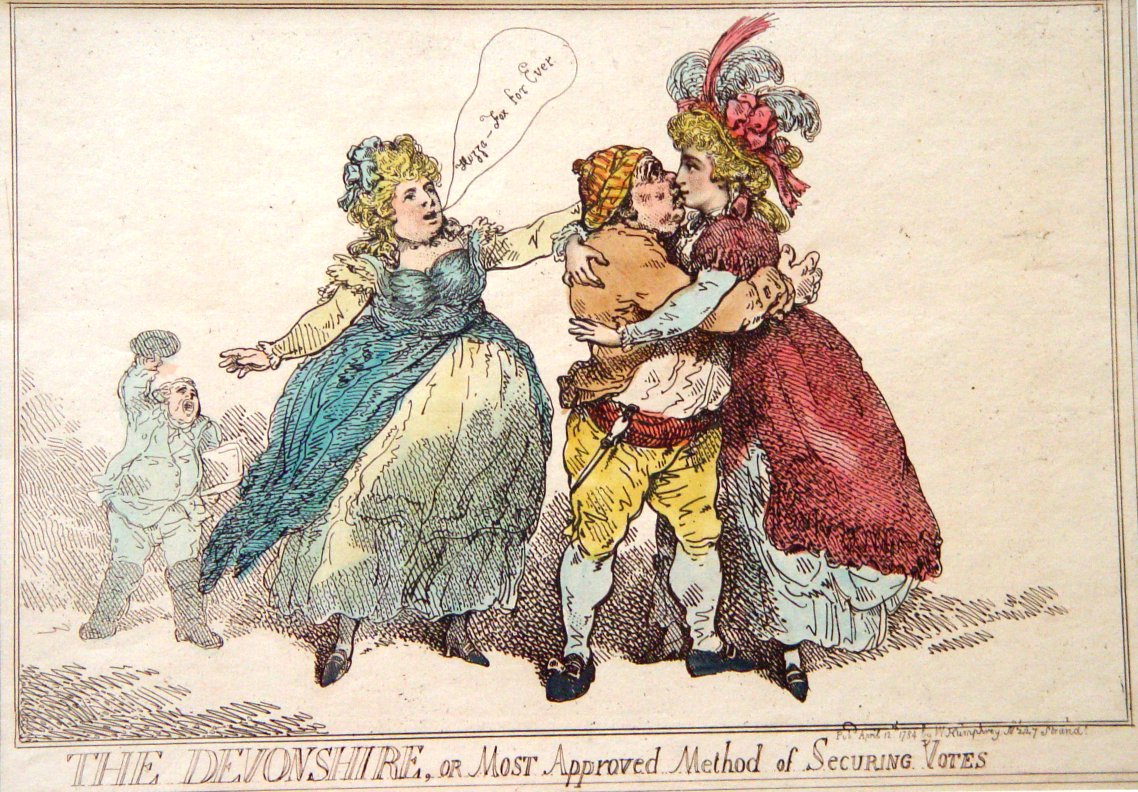|
Richard Vernon (MP)
Richard Vernon (18 June 1726 – 16 September 1800) was a British horse breeder and trainer and a politician who sat in the House of Commons between 1754 and 1790. Early life Vernon was born on 18 June 1726, the eldest son of Henry Vernon MP of Hilton Park, Staffordshire. He undertook a Grand Tour through Italy and France in about 1743. He joined the army and was an ensign in the 1st Foot Guards in November 1744. In 1747, he was lieutenant and captain. By 1751 he was closely associated with the Duke of Bedford. Vernon was one of the original members of the Jockey Club. As early as 4 June 1751 the betting-book at the old White's Club records a wager between Lord March and Captain Richard Vernon, alias Fox alias Jubilee Dicky. Vernon was blackballed at the club in the following year because of his friendship with the Duke of Bedford. Horace Walpole described him as ‘a very inoffensive, good-humoured young fellow, who lives in the strongest intimacy with all the fashiona ... [...More Info...] [...Related Items...] OR: [Wikipedia] [Google] [Baidu] |
House Of Commons
The House of Commons is the name for the elected lower house of the bicameral parliaments of the United Kingdom and Canada. In both of these countries, the Commons holds much more legislative power than the nominally upper house of parliament. The leader of the majority party in the House of Commons by convention becomes the prime minister. Other parliaments have also had a lower house called a "House of Commons". History and naming The House of Commons of the Kingdom of England evolved from an undivided parliament to serve as the voice of the tax-paying subjects of the counties and of the boroughs. Knights of the shire, elected from each county, were usually landowners, while the borough members were often from the merchant classes. These members represented subjects of the Crown who were not Lords Temporal or Spiritual, who themselves sat in the House of Lords. The House of Commons gained its name because it represented communities (''communes''). Since the 19th cen ... [...More Info...] [...Related Items...] OR: [Wikipedia] [Google] [Baidu] |
1761 British General Election
The 1761 British general election returned members to serve in the House of Commons of the 12th Parliament of Great Britain to be summoned, after the merger of the Parliament of England and the Parliament of Scotland in 1707. This was the first Parliament chosen after the accession to the throne of King George III. It was also the first election after George III had lifted the conventional proscription on the employment of Tories in government. The King prevented the Prime Minister, the Duke of Newcastle, from using public money to fund the election of Whig candidates, but Newcastle instead simply used his private fortune to ensure that his ministry gained a comfortable majority. However, with the Tories disintegrating, as a result of the end of their proscription providing them with new opportunities for personal advancement, and the loyalty they felt to the new king causing them to drift apart, there was little incentive for Newcastle's supporters to stay together. What little ... [...More Info...] [...Related Items...] OR: [Wikipedia] [Google] [Baidu] |
Epsom Derby
The Derby Stakes, also known as the Epsom Derby or the Derby, and as the Cazoo Derby for sponsorship reasons, is a Group 1 flat horse race in England open to three-year-old colts and fillies. It is run at Epsom Downs Racecourse in Surrey on the first Saturday of June each year, over a distance of one mile, four furlongs and 6 yards (2,420 metres). It was first run in 1780. It is Britain's richest flat horse race, and the most prestigious of the five Classics. It is sometimes referred to as the "Blue Riband" of the turf. The race serves as the middle leg of the historically significant Triple Crown of British horse racing, preceded by the 2000 Guineas and followed by the St Leger, although the feat of winning all three is rarely attempted in the modern era due to changing priorities in racing and breeding, and the demands it places on horses. The name "Derby" (deriving from the sponsorship of the Earl of Derby) has been borrowed many times, notably by the Kentu ... [...More Info...] [...Related Items...] OR: [Wikipedia] [Google] [Baidu] |
Diomed
Diomed, foaled in 1777, was an English Thoroughbred race horse who won the inaugural running of the Derby in 1780. He was subsequently a successful sire in the United States. Racing years A bright chestnut standing 15 hands 3 inchesAhnert, Rainer L. (editor in chief), “Thoroughbred Breeding of the World”, Pozdun Publishing, Germany, 1970 he was named after the Ancient Greek hero Diomedes. By the unraced Florizel out of the unraced Pastorella's Dam, aka Sister to Juno (both going back to the Godolphin Arabian, and Sister to Juno going back as well to the Darley Arabian), Diomed was bred by the Hon. Richard Vernon and owned by Sir Charles Bunbury, then trained by him at Hilton Hall. He was started 19 times, winning 11 races, finishing second in 4, and third in 3. Of these eleven wins, ten were consecutive, which included the inaugural running of The Derby in 1780. During these early bright years of Diomed's life, he was considered by many to be the best colt seen in ... [...More Info...] [...Related Items...] OR: [Wikipedia] [Google] [Baidu] |
Epsom Oaks
The Oaks Stakes is a Group 1 flat horse race in Great Britain open to three-year-old fillies. It is run at Epsom Downs over a distance of 1 mile, 4 furlongs and 6 yards (2,420 metres), and it is scheduled to take place each year in late May or early June. It is the second-oldest of the five Classic races, after the St Leger. Officially the Cazoo Oaks, it is also popularly known as simply The Oaks. It has increasingly come to be referred to as the Epsom Oaks in both the UK and overseas countries, although 'Epsom' is not part of the official title of the race.) It is the third of Britain's five Classic races to be held during the season, and the second of two restricted to fillies. It can also serve as the middle leg of the Fillies' Triple Crown, preceded by the 1000 Guineas and followed by the St Leger, although the feat of winning all three is rarely attempted. History The event is named a ... [...More Info...] [...Related Items...] OR: [Wikipedia] [Google] [Baidu] |
Diomed By John Nott Sartorius
Diomed, foaled in 1777, was an English Thoroughbred race horse who won the inaugural running of the Derby in 1780. He was subsequently a successful sire in the United States. Racing years A bright chestnut standing 15 hands 3 inchesAhnert, Rainer L. (editor in chief), “Thoroughbred Breeding of the World”, Pozdun Publishing, Germany, 1970 he was named after the Ancient Greek hero Diomedes. By the unraced Florizel out of the unraced Pastorella's Dam, aka Sister to Juno (both going back to the Godolphin Arabian, and Sister to Juno going back as well to the Darley Arabian), Diomed was bred by the Hon. Richard Vernon and owned by Sir Charles Bunbury, then trained by him at Hilton Hall. He was started 19 times, winning 11 races, finishing second in 4, and third in 3. Of these eleven wins, ten were consecutive, which included the inaugural running of The Derby in 1780. During these early bright years of Diomed's life, he was considered by many to be the best colt seen in ... [...More Info...] [...Related Items...] OR: [Wikipedia] [Google] [Baidu] |
1790 British General Election
The 1790 British general election returned members to serve in the House of Commons of the 17th Parliament of Great Britain to be summoned after the merger of the Parliament of England and the Parliament of Scotland in 1707. Political situation The Prime Minister since 1783, William Pitt the Younger, led a coalition of Whig and Tory politicians. The principal opposition to Pitt was a faction of Whigs led by Charles James Fox and the Duke of Portland. Dates of election The general election was held between 16 June 1790 and 28 July 1790. At this period elections did not take place at the same time in every constituency. The returning officer in each county or parliamentary borough fixed the precise date (see hustings for details of the conduct of the elections). This was the first general election after the law had been changed in 1785 to limit the maximum duration of polling in county elections to fifteen days. Under the old law, the poll could remain open longer. For example ... [...More Info...] [...Related Items...] OR: [Wikipedia] [Google] [Baidu] |
Newcastle Under Lyme (UK Parliament Constituency)
Newcastle-under-Lyme is a constituency in northern Staffordshire created in 1354 and represented in the House of Commons of the UK Parliament since 2019 by Aaron Bell of the Conservative Party. It was the last to be co-represented by a member of the Conservative Party when it was dual-member, before the 1885 general election which followed the Redistribution of Seats Act 1885 coupled with the Reform Act 1884. In 1919 the local MP, Josiah Wedgwood, shifted his allegiance from the Liberal Party — the Lloyd George Coalition Liberals allying with the Conservatives — to the Labour Party and the seat elected the Labour candidate who has stood at each election for the next hundred years, a total of 29 elections in succession. Labour came close to losing the seat in 1969, 1986, 2015 and 2017, and eventually lost the seat in 2019. Its 2017 general election result was the fifth-closest result, a winning margin of 30 votes. In 2019, it was subsequently won by the Conserv ... [...More Info...] [...Related Items...] OR: [Wikipedia] [Google] [Baidu] |
1784 British General Election
The 1784 British general election resulted in William Pitt the Younger securing an overall majority of about 120 in the House of Commons of Great Britain, having previously had to survive in a House which was dominated by his opponents. Background In December 1783, George III engineered the dismissal of the Fox–North coalition, which he hated, and appointed William Pitt the Younger as Prime Minister. Pitt had very little personal support in the House of Commons and the supporters of Charles James Fox and Lord North felt that the constitution of the country had been violated. The doctrine that the government must always have a majority in the House of Commons was not yet established and Fox knew he had to be careful. On 2 February 1784 Fox carried a motion of no confidence which declared "That it is the Opinion of this House, That the Continuance of the present Ministers in their Offices is an Obstacle to the Formation of such an Administration as may enjoy the Confidence of thi ... [...More Info...] [...Related Items...] OR: [Wikipedia] [Google] [Baidu] |
English Chronicle
''The English Chronicle'' was a thrice-weekly evening newspaper founded in London London is the capital and List of urban areas in the United Kingdom, largest city of England and the United Kingdom, with a population of just under 9 million. It stands on the River Thames in south-east England at the head of a estuary dow ... in 1779. History and profile ''The Chronicle'' was founded in 1779 although the founders are not known. In 1781 it was given the supplementary title ''Or, Universal Evening Post''. The paper was acquired by John Weble and John Bell in 1786. In 1802 the paper merged with the '' Whitehall Evening Post'' to become ''The English Chronicle, or, Whitehall Evening Post''. The newspaper ceased publication in 1843. References 1779 establishments in England Defunct newspapers published in the United Kingdom Publications established in 1779 Publications disestablished in 1843 Newspapers published in London {{italic title ... [...More Info...] [...Related Items...] OR: [Wikipedia] [Google] [Baidu] |
1780 British General Election
The 1780 British general election returned members to serve in the House of Commons of the 15th Parliament of Great Britain to be summoned after the merger of the Parliament of England and the Parliament of Scotland in 1707. The election was held during the American War of Independence and returned Lord North to form a new government with a small and rocky majority. The opposition consisted largely of the Rockingham Whigs, the Whig faction led by the Marquess of Rockingham. North's opponents referred to his supporters as Tories, but no Tory party existed at the time and his supporters rejected the label. Summary of the constituencies See 1796 British general election for details. The constituencies used were the same throughout the existence of the Parliament of Great Britain. Dates of election The general election was held between 6 September 1780 and 18 October 1780. At this period elections did not take place at the same time in every constituency. The returning officer ... [...More Info...] [...Related Items...] OR: [Wikipedia] [Google] [Baidu] |
Okehampton (UK Parliament Constituency)
Okehampton was a parliamentary borough in Devon, which elected two Members of Parliament (MPs) to the House of Commons in 1301 and 1313, then continuously from 1640 to 1832, when the borough was abolished by the Great Reform Act. History The borough consisted of part of the parish of Okehampton, an entirely rural area with the small market town of Okehampton itself at its centre. In 1831, the population of the borough was 1,508, and contained 318 houses; the whole parish had a population of 2,055. From its revival in the 17th century, the right to vote in Okehampton rested with all the freeholders and freemen of the borough, but the Town Corporation had considerable influence over the rest of the voters, and when it was unable to have its way by persuasion did not always stop short of outright coercion. In 1705 at the corporation's instigation an Okehampton freeman was forced into the army, and then offered his discharge if he would vote for Sir Simon Leach. (This was illega ... [...More Info...] [...Related Items...] OR: [Wikipedia] [Google] [Baidu] |




